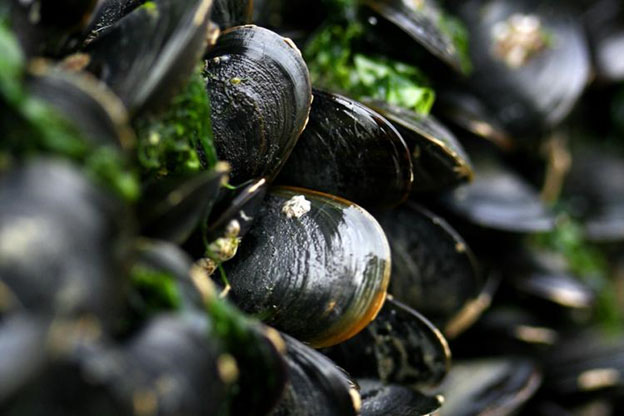Ocean acidification, resulting from changes in atmospheric carbon dioxide concentrations, will impact how a variety of chemicals, including metals, behave in the environment. This could lead to increased uptake of metals in important species, such as blue mussels. Body burdens of pollutants in bivalves are important considerations for seafood safety and, as a result, aquaculture. We will explore these relationships both in the laboratory and the field, and produce a robust data set that will be useful to stakeholders in coastal management and aquaculture and provide the societal benefit of better informed aquaculture siting.

Why We Care
Blue mussels are an important aquaculture species in the northeastern United States. Elevated levels of metals in mussel tissues could affect the marketability of farmed mussels, from a seafood safety perspective. The potential link between changing atmospheric carbon dioxide levels (which impact marine carbonate chemistry) and metals uptake in blue mussels has not previously been quantified, but could be an important management issue as carbon dioxide levels increase.
What We Are Doing
Given the complexity of ocean acidification–driven metals geochemistry and bioaccumulation in marine and coastal environments, we will conduct a multi-phased project. The outcomes of each phase will inform the next steps, with an ultimate goal of assessing the impacts that metals (amounts and the various forms in which they exist) have on blue mussels.
-
- In the first phase (year 2021), we will use a laboratory flow-through system to evaluate total metals uptake in blue mussels (Mytilus edulis) across a range of ocean acidification regimes. Ocean acidification treatment levels will be representative of the region via data from the NCEI and IOOS databases. Rather than dosing the water with a metals solution, the mussels will be exposed to ambient concentrations of metals in natural seawater. Existing data on metal bioaccumulation in mussels from the NOAA Mussel Watch and Gulf of Maine Gulfwatch programs will be used to support this phase. Following an equilibration period in the saltwater flow-through system, blue mussels in three independent replicates for each ocean acidification level will be exposed to three ocean acidification regimes. Tissue samples will be collected for metals analysis at multiple time points during the four month long experiment. The following metals will be quantified in mussel tissues: aluminum, antimony, arsenic, cadmium, chromium, copper, iron, lead, manganese, mercury, nickel, selenium, silica, silver, tin, and zinc.
- In the second phase of the project (year 2022), speciation considerations will be addressed. Coastal ocean acidification affects the oxidation state of metals (speciation), which in turn affects metal bioaccumulation and toxicity in marine organisms. As pH decreases, the forms of certain metals could become more toxic. Based on the results of phase one, the speciation of selected metals under the same ocean acidification regimes will be quantified in the laboratory. This will allow for a better understanding of what is driving the observed changes (if any) in tissue concentrations (e.g., speciation versus physiological change in organisms driven by other ocean acidification parameters).
- Based on the results of years one and two, in phase three (year 2023) metals measurements will be made in caged blue mussels at field sites across a regional (New England) ocean acidification gradient. While making these measurements in the field will introduce significant additional variability, being able to measure and understand these patterns in ambient marine conditions is important to being able to make educated decisions about aquaculture siting and seafood safety.
